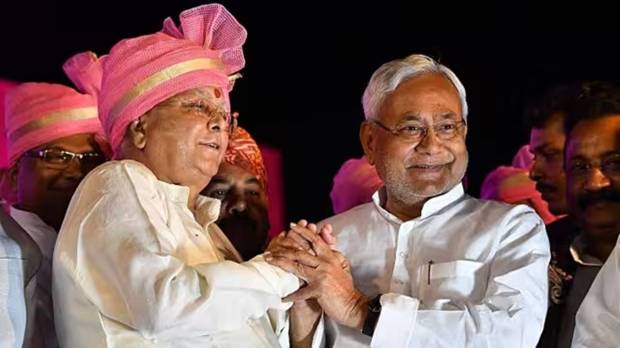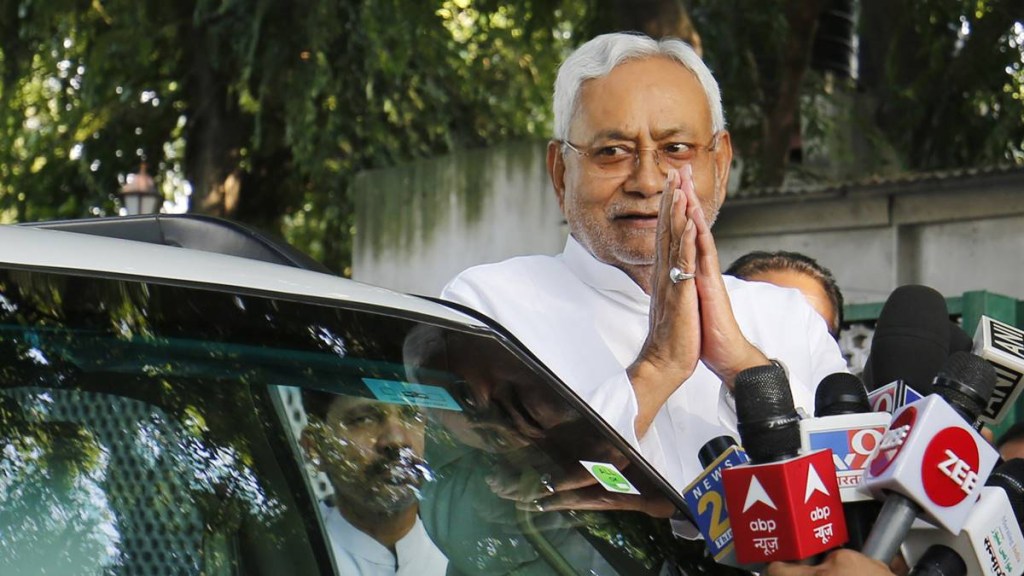The release of the caste census data by Bihar Chief Minister Nitish Kumar on Gandhi Jayanti virtually swept the ground from beneath the Bharatiya Janata Party’s feet. In one fell swoop, Nitish managed to resurrect his diminishing graph within the Opposition’s INDIA bloc and threatened to deprive the Bharatiya Janata Party, and Prime Minister Narendra Modi, of their OBC vote base, a carefully crafted life support system developed during their term in power.
Floundering for answers, the BJP’s response in Bihar oscillated between two extremes — attempts to association and outright rejection. Former deputy chief minister Sushil Modi sought to credit the BJP for the move, stating that it was among the parties that backed the caste census. Simultaneously, his party colleague and Union minister Giriraj Singh rejected the caste census report released by the Bihar government, terming it “a ploy to hoodwink the people of the state to hide its own failures”.
Also Read: Delimitation, Muslim rights: Modi unveils strategic counter to Opposition’s caste census gambit
BJP on backfoot?
It was only after PM Modi stepped in and acknowledged the Congress’ “Jitni Abaadi Utna Haq” pitch during his speeches in Telangana and Chhattisgarh that one could sense a structured response to the crisis at hand on part of the BJP. Notably, the PM chose to limit his attack to the Congress while carefully steering clear of any mention of the Bihar caste census or the Opposition’s demand for a similar exercise on a pan-India level.
Two narratives appear to have formed for the BJP as a takeaway from PM Modi’s speeches. While the one in the heartland was premised around Muslim rights, implying that minorities would stand to lose their rights if they were to be accorded on the basis of population, the one for South India hinged on parliamentary representation. South India could cumulatively lose 100 Lok Sabha seats if Congress’ idea was applied to the delimitation process, PM Modi warned in Telangana.
Also Read: Caste census, OBC focus: In Rahul Gandhi’s push, a historic course correction for Congress
More than the effectiveness, both narratives reflect the impact that Nitish’s move has left on the BJP and a deep sense of desperation to address it quickly. And rightly so. Other Backward Classes or OBCs have contributed significantly to the BJP’s stellar performance in the 2019 Lok Sabha elections. The 37.6 per cent vote share that the BJP received, a two-fold growth from 2009, was largely attributed to the party’s social engineering that saw an overwhelming number of OBCs backing the Prime Minister. So, the chances of negating the caste census, or even the idea of it, are bleak.
But allowing Nitish to run home as the champion of OBC rights is not a plausible option for Modi either. The Prime Minister, whom the BJP often positions as the tallest OBC leader, has designed his policies and outreach to devise a social engineering, combined with his own popularity, that acts as a counterplay to the caste-centric politics of the fragmented Opposition. And it is this precise social engineering that Nitish Kumar, a champion of caste algorithms himself, promises to turn on its head.
Master of his craft
A politician as shrewd as it gets, Nitish knows his chops. The gambit he has taken may not bear immediate fruit but his sight is clearly set on the bigger picture. Consider the findings of the Bihar caste census as the context.
Also Read: Bihar caste census 2023 report: 63% Other Backward Classes, 16% population in General category
The survey pegged OBCs at 63 per cent of the state’s population. While immediate political calculations would give the RJD of Lalu Yadav, whose community of Yadavs emerged as the largest sub-group within the categorisation and accounts for 14.27 per cent of all OBC categories, an immediate edge in Bihar. Combined with Muslims who constitute 17.7 per cent of the population, the RJD can boast of a sizable vote share of around 32 per cent.

However, Nitish’s grand plan lies in the scope that the caste census, acting as a template for other states, offers. Nitish is hoping that the Bihar caste census opens up a debate on breaching the 27 per cent cap on OBC quota and the 50 per cent reservation cap on overall reservations set by the Supreme Court. Parties aligned with separate sub-groups within the OBC category have already lapped up the demand. More are likely to follow considering the immediate electoral gains that a controversy on OBC reservations could potentially deliver.
Aware of his political relevance depreciating faster than the JD(U)’s numbers in the Bihar Assembly, Nitish’s hand is aimed at keeping the BJP as well as his alliance partner, Lalu Prasad Yadav’s Rashtriya Janata Dal, in check. The RJD, the single largest party in the Bihar Assembly, and the senior partner within the Mahagathbandhan, has been snapping on Nitish’s heels with an aim to install his son Tejashwi Yadav as his successor.
Also Read: Explained: Why the political demand for a nationwide caste census has resurfaced now
The RJD widely believes and has articulated more than once, that the next Assembly elections in Bihar will be fought by the Grand Alliance under Tejashwi’s leadership. This proposition, even endorsed by Nitish in the past, leaves the Bihar CM on shaky ground and in desperate need for a new narrative.
A new narrative
Nitish who does not have the backing of a significant social group, has nursed a Mahadalit constituency (comprising 21 SC groups, minus Paswans). The JD(U) supremo now has more cause to focus on the segment, hoping to beat the BJP as well as the Congress in the tussle for the Dalit vote. Nitish would hope that the caste census demand would reinvigorate his support base to rally behind him to consolidate their own collective position against the more dominant OBC sub-groups.
Also Read: Mandal 2.0? Bihar caste census brings Nitish Kumar back to INDIA centrestage
Will Nitish be able to survive the setback if the Opposition alliance ends up being on the losing side in the Lok Sabha elections despite rallying behind a caste census? Will the Congress, which has been aggressively positioning itself as a champion of the OBC cause cede ground to Nitish? Will the caste census, which places Nitish’s core vote base of Koiris and Kurmis at a meagre 4.27 per cent and 3 per cent, respectively, hamper his own standing within the Opposition?
The results to the Assembly elections could offer some pointers. But the bigger takeaway that Nitish would like voters to return home with would be of him as the leader who brought reservations back to mainstream political discourse. Will that guarantee his return to his days of glory? As the situation evolves and the poll season kicks in, Nitish has taken a gambit that could either resurrect his political career or push him to the fringes. There is no way out.

